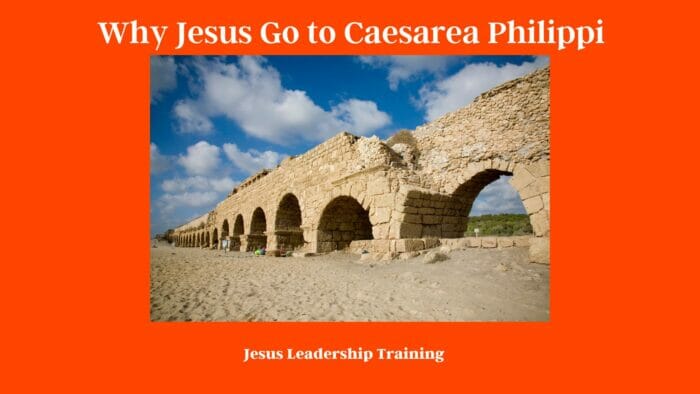Why Jesus Go to Caesarea Philippi – Jesus went to Caesarea Philippi to reveal His identity as the Messiah and establish the foundation of the Church. In this significant location, He asked His disciples, “Who do you say that I am?”, to which Peter replied, “You are the Christ, the Son of the living God.” Jesus affirmed Peter’s declaration, emphasizing the divine origin of this knowledge and establishing Peter as the rock upon which He would build His Church.
Table of Contents
Why Jesus Go to Caesarea Philippi
The life and ministry of Jesus Christ have always been a source of fascination and inspiration for millions of people around the world. His teachings, miracles, and actions have had a profound impact on the course of human history and continue to shape the beliefs and values of countless individuals. One of the most intriguing episodes in the life of Jesus is his journey to Caesarea Philippi, which has puzzled scholars and believers alike for centuries. In this article, we will explore the reasons behind Why Jesus Go to Caesarea Philippi and the significance of this event in his ministry.

The Context: A Brief Overview of Caesarea Philippi
Before delving into the main topic, it is important to understand the context in which the events of Caesarea Philippi took place. Caesarea Philippi was a city located in the northern part of Israel, near the foothills of Mount Hermon. In ancient times, the city was known as Paneas and was a center of worship for the pagan god Pan. In 20 BCE, the city was renamed Caesarea Philippi in honor of Caesar Augustus and Philip the Tetrarch, who was the son of Herod the Great. The city was a cosmopolitan hub of trade and commerce, with a diverse population of Jews, Greeks, and Romans.

Why Jesus Go to Caesarea Philippi: Unveiling the Purpose Behind the Journey
The journey of Jesus to Caesarea Philippi is recorded in the gospels of Matthew, Mark, and Luke. According to these accounts, Jesus and his disciples traveled to the region of Caesarea Philippi, where he posed a crucial question to his disciples, “Who do people say the Son of Man is?” (Matthew 16:13). This question was not random or trivial, but rather a strategic move by Jesus to elicit a response from his disciples that would reveal their understanding of his identity and mission.
Revealing His Identity
Jesus had been teaching and performing miracles throughout his ministry, and his reputation had spread far and wide. Many people had different opinions about him, and there were various theories about his identity. Some thought he was a prophet, others believed he was the reincarnation of John the Baptist or Elijah. However, Jesus wanted to know what his disciples thought of him, as they had been with him from the beginning and had seen him in action.
Testing His Disciples
By asking his disciples about his identity, Jesus was not seeking affirmation or validation. He was testing their understanding of his mission and their commitment to him. His question was a litmus test of their faith and their willingness to follow him. Peter’s response, “You are the Messiah, the Son of the living God” (Matthew 16:16), was a pivotal moment in the disciples’ journey of faith and a turning point in Jesus’ ministry.
Unveiling His Plan
After Peter’s confession, Jesus made a remarkable statement that revealed his plan and purpose for his ministry. He said, “And I tell you that you are Peter, and on this rock, I will build my church, and the gates of Hades will not overcome it” (Matthew 16:18). This statement was significant for several reasons. First, it confirmed Peter’s confession that Jesus was the Messiah, the Son of the living God. Second, it revealed that Jesus intended to establish a new community of believers, which would be founded on the faith of his disciples. Third, it indicated that
Third, it indicated that Jesus intended to establish a new community of believers, which would be founded on the faith of his disciples. Third, it indicated that Jesus intended to establish a new community of believers, which would be founded on the faith of his disciples. This new community, which we now know as the church, would be a place of refuge and strength for believers, and it would be impervious to the powers of darkness and evil.

The Significance of Caesarea Philippi in Jesus’ Ministry
The journey of Jesus to Caesarea Philippi was a significant event in his ministry for several reasons.
Proclaiming His Identity as the Messiah
The confession of Peter that Jesus was the Messiah, the Son of the living God, was a turning point in Jesus’ ministry. It was a public declaration of his identity and his mission, and it marked the beginning of a new phase in his ministry. From this point on, Jesus began to teach his disciples more explicitly about his coming suffering, death, and resurrection, and he prepared them for the events that were to come.
Establishing the Church
The statement of Jesus that he would build his church on the faith of his disciples was a prophetic proclamation of the establishment of the church. Jesus intended to create a community of believers who would be united in their faith and committed to his mission. The church would be a place of refuge and strength for believers, and it would be a powerful force for good in the world.
Confronting the Powers of Darkness
The location of Caesarea Philippi was significant in Jesus’ ministry because it was a place of pagan worship and idolatry. The city was known for its temple to the pagan god Pan, and it was believed to be the gateway to the underworld. By proclaiming his identity and his mission in this place, Jesus was confronting the powers of darkness and evil and establishing his authority over them.
The story of Jesus’ visit to Caesarea Philippi is one of the most interesting and significant events in the Gospels. It has been a source of inspiration to many throughout history and is referenced in several places in the Bible. In this blog, we will explore the historical and religious significance of Jesus’ visit to Caesarea Philippi. We will look at the Israelite roots of Jesus’ journey, examine ancient traditions around his pilgrimage, and consider the religious importance of this visit.
Uncovering the Historical Significance of Jesus’ Visit to Caesarea Philippi
The story of Jesus’ visit to Caesarea Philippi is found in the Gospels. According to the Bible, Jesus and his disciples traveled to Caesarea Philippi in the region of Galilee. During this visit, Jesus asked his disciples, “Who do people say that I am?” It was here that Peter declared his belief that Jesus was the Messiah.
The visit to Caesarea Philippi was a significant event in the life of Jesus and a major turning point in his ministry. This was the first time Jesus was openly acknowledged as the Son of God and the Messiah by his disciples. The importance of this event is reflected in the biblical accounts of Jesus’ life.

Exploring the Israelite Roots of Jesus’ Journey to Caesarea Philippi
The significance of Jesus’ journey to Caesarea Philippi goes beyond the religious significance. The region of Galilee has a long history in the Jewish faith and is deeply connected to the history of the Israelites. Caesarea Philippi was an important city in the region, and it is believed that it was in this region that the prophet Elijah made his famous ascension to Heaven.
In addition to its spiritual importance, the region of Galilee was also an important cultural center. The region was home to a number of important religious festivals, including the Festival of the Tabernacles. This festival was a celebration of the Israelites’ deliverance from slavery in Egypt and was held in the region of Galilee for many years.
The Story Behind Jesus’ Journey to Caesarea Philippi
The story of Jesus’ visit to Caesarea Philippi is deeply intertwined with the history of the Israelites. The city of Caesarea Philippi was a center of pagan worship in the ancient world. It was home to the temple of Pan, the Greek god of shepherds and flocks. The people of Caesarea Philippi worshipped this god and held festivals in his honor.
When Jesus visited the city, he was met with a great deal of hostility. The people of the city were not receptive to his teachings and his presence was seen as a threat to the city’s pagan practices. Jesus’ pilgrimage to Caesarea Philippi was a powerful statement against the paganism of the city and a declaration of faith in the one true God.
Ancient Traditions Surrounding Jesus’ Pilgrimage to Caesarea Philippi
The story of Jesus’ visit to Caesarea Philippi has inspired many traditions throughout the centuries. One of the oldest traditions is the annual pilgrimage to Caesarea Philippi during the Feast of the Tabernacles. This pilgrimage was first recorded in the first century CE and continues to be an important part of the Feast of the Tabernacles today.
In addition to the pilgrimage, there are also several other traditions associated with Jesus’ visit to Caesarea Philippi. For example, many churches have a tradition of blessing their congregations with water from the springs of Caesarea Philippi. This is a reminder of Jesus’ presence in the region and his declaration of faith in the one true God.
Examining the Religious Significance of Jesus’ Visit to Caesarea Philippi
The visit to Caesarea Philippi is an important part of the Christian faith. The story of Jesus’ visit to Caesarea Philippi is a powerful reminder of the importance of faith in God and the power of Jesus’ teachings. The pilgrimage to Caesarea Philippi is a reminder that Jesus is the Messiah and the Son of God and his teachings are to be followed and obeyed.
Jesus’ visit to Caesarea Philippi was also a reminder of the importance of standing up for what is right and true. Jesus was not welcomed in the city and was met with hostility and resistance. However, Jesus was determined to speak the truth and to proclaim the truth of God’s love and mercy. His visit to Caesarea Philippi is a powerful reminder that we should all stand up for what is right and true, no matter what the cost may be.
The story of Jesus’ visit to Caesarea Philippi is one of the most significant and inspiring stories in the Bible. It is a reminder of the importance of faith in God and the power of Jesus’ teachings. The pilgrimage to Caesarea Philippi is also a reminder of the importance of standing up for what is right and true, no matter what the cost may be. As we explore the historical and religious significance of Jesus’ visit to Caesarea Philippi, we can gain a better understanding of the importance of Jesus’ teachings and how they continue to shape our lives today.
FAQs
Q: What was the significance of Peter’s confession in Caesarea Philippi? A: Peter’s confession that Jesus was the Messiah, the Son of the living God, was a turning point in Jesus’ ministry. It was a public declaration of his identity and his mission, and it marked the beginning of a new phase in his ministry.
Q: Why did Jesus go to Caesarea Philippi? A: Jesus went to Caesarea Philippi to test his disciples’ understanding of his identity and mission, to reveal his plan and purpose for his ministry, and to confront the powers of darkness and evil in that place.
Q: What was the significance of Jesus’ statement about building his church? A: Jesus’ statement that he would build his church on the faith of his disciples was a prophetic proclamation of the establishment of the church. Jesus intended to create a community of believers who would be united in their faith and committed to his mission.
Final Thoughts – Why Jesus Go to Caesarea Philippi
The journey of Jesus to Caesarea Philippi was a pivotal moment in his ministry, and it has significant implications for believers today. The confession of Peter that Jesus was the Messiah, the Son of the living God, was a turning point in Jesus’ ministry, and it marked the beginning of a new phase in his mission. By proclaiming his identity and his mission in that place, Jesus was confronting the powers of darkness and evil and establishing his authority over them.
His statement about building his church on the faith of his disciples was a prophetic proclamation of the establishment of the church, which continues to this day. Understanding the significance of Caesarea Philippi in Jesus’ ministry can deepen our appreciation for his identity and his mission and inspire us to be more committed to his cause.



